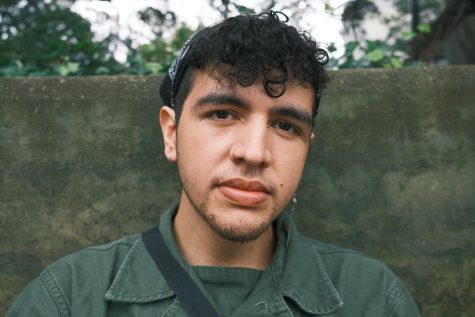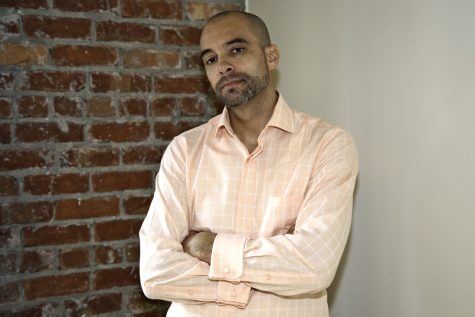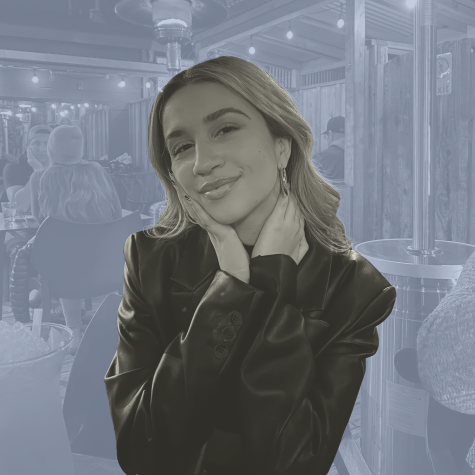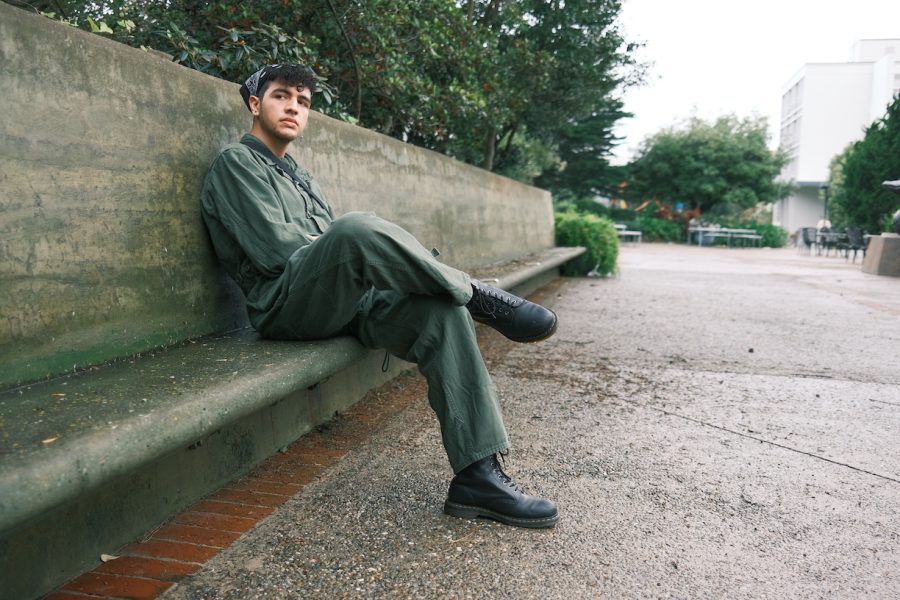Overcoming Mental Health in Latinx and Hispanic Households
CAMERON LEE G.
Alexiz Romero, 22, sits on a concrete bench at San Francisco State University on Tuesday, November 9, 2021. The mindset that comes with the role of machismo, like not showing emotion adds the difficulties faced by the Latinx/Hispanic community in the United States. (Cameron Lee / Xpress Magazine)
Nina Nazario, 23, struggles with discussing her post-traumatic stress disorder with her father. She feels it’s harder for older generations in Hispanic culture to share comfort surrounding mental health.
Suffering in silence has been known as a way to cope in Latinx and Hispanic communities for generations.
According to a survey by the Substance Abuse and Mental Health Services Administration (SAMHSA), mental health issues are rising in Latinx and Hispanic communities for people between the ages of 12 and 49. SAMHSA is an agency within the U.S. Department of Health and Human Services that works to reduce the impact of substance abuse as well as mental illness.
“There’s just so much shared trauma that older generations from Hispanic families have gone through that is not spoken about,” Nazario said.
She explained that it wasn’t until she was officially diagnosed that she felt her father could finally grasp that she was struggling with PTSD.
Nazario understood that this developed from her father’s own trauma, her grandfather’s trauma and possibly her great grandfather’s trauma, all of which was never brought to light within their family.
“I think it also stems from times in his life where he didn’t have anyone to turn to, so it just became normal for him to look forward and move on,” she added.
Not only is generational trauma a large aspect of stigmas surrounding mental health in Latinx and Hispanic communities, but generational age gaps are as well.
Alexiz Romero, 22, realized they are not alone in this process. They explained that the huge generational gap between them and their 59-year-old mother affects her understanding of Romero’s depression.
“With her being born and raised in Mexico and me being born and raised here in the U.S., being a Chicano compared to a Mexicano is a very different experience,” Romero said. “It’s a very different way of learning and growing.”

Romero also mentioned how the role of machismo, which is strong or aggressive masculine pride, plays into mental health and how prevalent it is in Mexican culture. They said that not only is machismo heavily rooted in gender roles, but it’s also a mindset that contributes to men needing to “act like men” and not show any emotion.
“It’s really hurtful to have to live up to that because we’re humans, we have emotions,” they added. Dealing with this stigma growing up took a toll on Romero.
“I was very emotional, I cried a lot,” they said. This was looked down upon by their mother and classmates.
Romero believes that the large stigma in machismo culture can make mental illness be seen as a joke or exaggerated.
Jeff Duncan-Andrade, Latino/a and Race and Resistance Studies professor at San Francisco State University, believes that society has eroded the infrastructure for mental health services.
“The schools that serve our Latinx children have taken away counseling, they’ve taken away art and music, they’ve taken away things that are therapeutic to mental health,” he said.
According to a Salud America! research review, 22% of Latino youth have depressive symptoms.
Duncan-Andrade explained that the places young people used to get institutional support for their mental health are now gone. He also stressed the aspect of religion and the safe space it gives to Latinx and Hispanic communities, mentioning that it provides a consistent social space and structure.
“Prayer is, to some degree, a form of meditation,” Duncan-Andrade said.

Nazario agreed, adding that her aunt’s devotion to her religion is what she credits when it comes to her well-being and peace of mind.
Along with Duncan-Andrade, Nazario believes that the use of religion in Latinx communities does a lot for people’s mental health. However, she feels like it can come with some challenges as well.
In a Rutgers University-New Brunswick study, it was found that religious beliefs may discourage many Latinx people in the U.S. from seeking treatment for mental health disorders.
“When you come from a family like that, it’s even harder for them to understand that you’re going through your own thing and praying can’t really help,” Nazario said.
Latinx and Hispanic people are more likely to seek help for a mental disorder from a primary care provider rather than a mental health specialist, according to a 2017 study by Mental Health America.
This is due to the lack of access to health care and mental health care for minorities in America, as well as the racial and ethnic disparities in mental health care, as is shown in an article published by Health Affairs. The article states that not only are minority patients more likely to receive poor quality care when treated but that they are also less likely to receive the best available treatments for depression and anxiety.
Romero, who grew up in Oxford, California, a predominantly Mexican town, experienced the hardships of health discrimination first hand. According to Romero, minorities aren’t able to get the help they need or even recognize what mental health issues they may need help with in the first place.
“If you have Medicaid, you’re not given good treatment at all. It was really hard,” they said.
In another study done by Mental Health America, it was stated that there is a perception in Latinx and Hispanic communities that discussing mental health can create shame for the family. This can also result in fewer people seeking treatment.
Oscar Jimenez, 29, deeply resonates with the struggle of feeling embarrassed within his family.
He expressed that growing up, it was common for things to be swept under the rug. It wasn’t until Jimenez’s mid-20s that he confronted his childhood trauma and began to speak openly about it. Jimenez’s mental health was depleting and he faced severe depression, so he made the decision to see a therapist for the first time.
“I still haven’t mustered up the courage to tell my family or my parents that I’m going to a therapist, because I do still feel that stigma that they’re gonna judge me,” he said.
Jimenez added that although he knows seeing a therapist benefits his life, he still feels that it’s something he can’t talk about with his family.
“I feel like when we can discuss those things and acknowledge what’s happened to us, we can break the cycle and start something new,” Jimenez said.

Gia Opsahl (she/her) is a writer and creative based in Monterey, California. She is a journalism major with a minor in race and resistance. Opsahl is extremely...



Mj • Nov 18, 2021 at 3:17 pm
Beautiful article